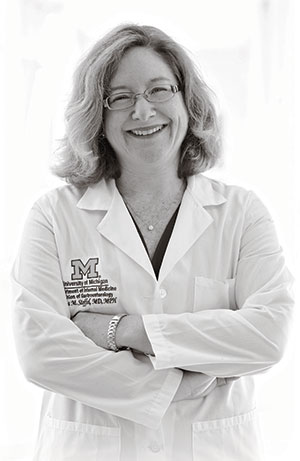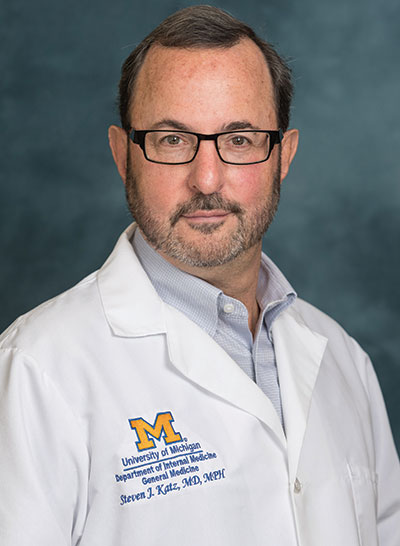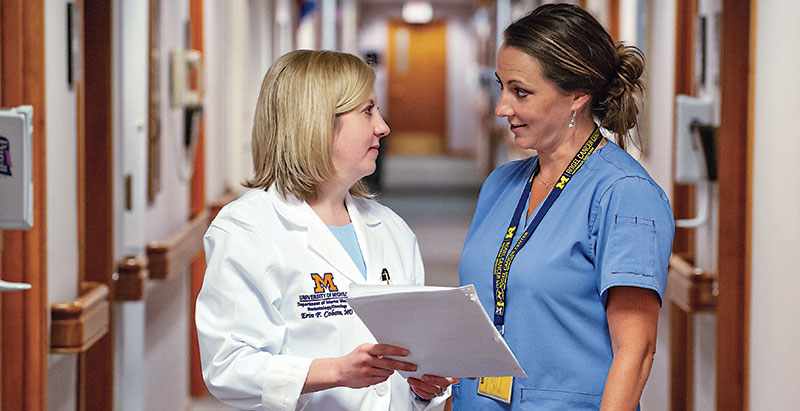Genetic Data Impacts Clinical Cancer Care
By Beth Uznis Johnson
An increased demand for genetic testing engages patients and family members
Cancer by definition is a genetic disease caused by alterations in the genetic code that occur in individual cells. Most cancer develop when these alterations transpire at random in a person's life, while others are facilitated from an inherited copy of a particular gene that causes cells to become cancerous more easily.
As genetic testing of tumor tissue becomes more common among patients recently diagnosed with cancer and moves closer to standard of care for identifying certain types of alterations, these genetic data are being systematically collected and analyzed by researchers. In addition to testing genes in tumors, there is increased interest in understanding whether individuals have hereditary alterations in genes that promote cancer.

One of the first cancer centers to perform comprehensive, whole exome clinical sequencing of advanced cancer tumors, the University of Michigan Rogel Cancer Center is now using compiled data to shed light on what genetic alterations occur in the tumor relative to the patient’s normal -- germline -- genome.
These rich collections of genetic data are allowing researchers to develop new targeted therapies, match patients to clinical trials based on genetic alterations, better manage patients and at-risk family members, and take steps to utilize precision oncology approaches earlier in the process, before tumors have evolved and developed resistance mechanisms making them more challenging to treat.
Understanding molecular drivers of advanced cancer
In a 2017 paper in Nature, researchers at the Rogel Cancer Center found a significant increase in the number and type of genetic mutations between metastatic cancer and primary cancer. Nearly every case of metastatic cancer in 500 adult patients with solid tumors had more mutations.
Sequencing RNA in addition to DNA revealed a host of molecular factors that play a role in the tumor microenvironment, fostering and allowing the cancer to continue to grow, spread or evade treatment. Researchers found RNA sequencing shed light on the underlying mechanisms that either turn on cancer-causing genes or turn off the genes meant to stop cancer. This could help identify potential targets for treatment.
As part of the Michigan Oncology Sequencing Program, known as Mi-ONCOSEQ , patients undergo a CT-guided biopsy of their metastatic tumors and provide blood samples to test their normal DNA,the germline. Whole exome sequencing is carried out on all expressed genes -- both DNA and RNA -- and compared with germline sequencing. Since its inception nearly a decade ago, more than 3,500 patients with advanced cancer at the Rogel Cancer Center have elected to have whole or targeted exome sequencing.
A computational approach is used to analyze the data and create molecular reports, which are discussed at a precision medicine tumor board that includes a team of oncologists, genetics specialists, pathologists, bioinformatics specialists and genetic counselors, among others. Results are shared with patients, who also receive genetic counseling.
“The focus is on discovering key targets or biomarkers in individual patients that can be developed into diagnostic and prognostic tests for patients, as well as understanding the biology of an individual patient’s cancer,” says Arul Chinnaiyan, M.D., Ph.D., director of the Michigan Center for Translational Pathology. “By understanding what’s driving the tumor from a molecular basis and how they mechanistically work, we can develop therapies or match patients to the right therapies.”

Another striking finding in the Nature paper was that 12% of the metastatic cancer patients harbored an inherited mutation. About three-quarters were related to the process of DNA repair, which several existing therapies are designed to target.
As is the case in cancer discovery, Chinnaiyan’s vision for Mi-ONCOSEQ and initial study results led scientists down many paths for further research -- some anticipated, others not -- but all needing exploration.
Using genetics data in the clinic
Fast forward to 2020 where Elena Stoffel, M.D., MPH, directs the Cancer Genetics Clinic and Sofia D. Merajver, M.D., Ph.D., directs the Breast and Ovarian Cancer Risk Evaluation Program at the Rogel Cancer Center. The demand for genetic testing is increasing tremendously. The information is instrumental in both determining treatment algorithms for patients with cancer, but also risk-stratifying relatives and improving the ability to prevent cancers in at-risk family members.
Stoffel’s and Merajver’s research interests involve the longitudinal management of people with genetic predisposition to cancer, specifically hereditary gastrointestinal cancers (Stoffel) and breast cancer (Merajver). Lynch Syndrome and hereditary breast and ovarian cancer are defined as high-penetrance hereditary cancer syndromes. Both impact approximately 1 in 300 people.
Stoffel also studies the incidence of colorectal cancers in young people, those diagnosed before the age of 50. In a 2019 paper in Gastroenterology, findings indicated that 20% of young people diagnosed with colorectal cancer have an inherited genetic abnormality that predisposes them to its development.
“Our study suggests that even in the absence of a family history of cancer, the prevalence of inherited factors is so high in young colorectal cancer patients that it makes sense to test everyone, as these heritable alterations can impact their care as well as the care of their family members,” Stoffel says.
Because of their roles in the management of patients at hereditary risk for cancer, Stoffel and Merajver collaborate broadly with researchers across the Rogel Cancer Center with expertise in cancer genetics, including those working to:
- identify biomarkers and other drivers of cancer tumors
- understand the molecular profile of cancer tumors across disease types
- pinpoint particular signatures of tumors that may be associated with different responses to different therapies
- develop new targeted therapies like immune checkpoint inhibitors and PARP inhibitors
- identify patients with pre-genetic syndromes and ensure appropriate follow up
- explain disparities in cancer incidence and prognosis
- manage the longitudinal care of cancer survivors

What Stoffel is most excited about in her work is that insights are being developed to move beyond a one-size-fits-all strategy in terms of cancer screening, prevention and treatment to a personalized approach for each patient.
“Through the molecular profiling being done at the Rogel Cancer Center, we’re identifying particular signatures of tumors,” Stoffel says. “Understanding these basic molecular mechanisms that underlie different cancer types, we now know some genes overlap cancer types. These breakthroughs are allowing us to move towards an approach where we tailor our treatments to the underlying processes rather than just the same old way of treating the cancer type.”
In the Merajver lab, researchers are developing new therapies for the most aggressive cancers that arise in hereditary breast and ovarian cancer syndromes, as well as discovering the alterations in tumors most likely to respond to certain drugs, thus paving the way for true precision oncology. Both clinics work in teams of physicians and dedicated genetic counselors to provide comprehensive care to their patients and the family members.
Of the hundreds of genes in cancer, there are now several dozen that have clinical implication for management and prevention of cancer. Between Stoffel’s work in the Cancer Genetics Clinic and Merajver’s work in the Breast and Ovarian Risk Evaluation Clinic, more than 3,000 patients are referred each year for clinical genetic testing.
Making a difference worldwide for patients with rare diseases
With progress being made to understand the most common, highly penetrant and well-defined syndromes with genetic predispositions, what about those patients with more rare cancer syndromes?

Tobias Else, M.D., explains how collaboration -- across the U.S. and around the world -- to collect genetic data has made a difference in the lives of patients and family members with very rare endocrine tumors.
Else, associate professor of internal medicine at Michigan Medicine, runs a research laboratory closely tied to his work with patients in two clinics: Stoffel’s cancer genetics clinic and the Endocrine Oncology Clinic, led by Gary Hammer, M.D., Ph.D., Millie Schembechler Professor of Adrenal Cancer.
For the past several years, Else has managed the Michigan Endocrine Cancer Repository, which is the world’s most comprehensive genomic and genetic analysis of adrenal cancer. The adrenal researchers at U-M also started the American-Australian-Asian Adrenal Alliance, called A5, which now has around 30 institutions worldwide that contribute data. A5 has led to clues about rare adrenal and endocrine cancers that have directly informed Else’s work with patients in the clinic.
The rarity of endocrine diseases inherently challenges the ability to do impactful research, publish findings with broad application and develop guidelines to provide evidence-based clinical care. Else outlined these issues in a letter in Hormones and Cancer in 2019.
The A5 consortium is pivotal to uncover the molecular mechanisms of tumor growth and novel insights that will lead to the next generation of adrenal cancer therapies. It allows researchers globally to collaborate, identify biomarkers and genetic markers of adrenal cancer, study the genetic syndromes for these tumors, and accelerate discovery by enabling large-scale, long-term longitudinal studies of patients.
Else leads the von Hippel Lindau Comprehensive Clinical Care Center and follows 50–60 patients and at-risk family members with von Hippel-Lindau disease, a hereditary genetic condition also known as VHL. He collaborates with specialists throughout the Rogel Cancer Center and Michigan Medicine to guide the surveillance and decision-making process for this rare genetic syndrome, which can cause tumors of the kidney, adrenal glands, pancreas, and blood vessel tumors of the brain and eyes.
“Building long-term relationships with patients and families sparked my interest in endocrinology and cancer genetics,” Else says, adding that patients he first encountered as kids are now off to college. “You get to know them well, generation after generation.”
Else helps coordinate annual visits for VHL patients, where they have blood drawn for analysis and an MRI of the brain, spine and abdomen to screen for tumors. Patients also have an eye exam by an ophthalmologist and receive genetic counseling. By coordinating annual care, Else aims to make VHL prevention and screening a minimal part of patients’ everyday lives.

Communicating the value of testing and sharing results
Cancer registries that include genetic and other data are unique treasures in the United States, according to Steven J. Katz, M.D., MPH, professor of medicine and health management and policy at the University of Michigan. Much of his work week is dedicated to partnering with colleagues in academia, regional cancer registries, clinical practices and private industry to generate research that will ultimately improve the lives of cancer patients.
Katz, who is the director of the Cancer Surveillance and Outcomes Research Team at the Rogel Cancer Center, is inspired to understand how people make decisions when they’re diagnosed with cancer and how clinicians navigate those decisions with patients to yield the best possible outcomes.
His research using the National Cancer Institute Surveillance, Epidemiology and End Results registries in California, Georgia and Michigan looks at how germline genetic testing is being used after diagnosis of cancer across a broad array of patients in the community and the implications for both patients and their families.
“Genetic testing, both somatic and germline, have become important new avenues of the valuable information after diagnosis,” Katz says. “We have been leading efforts nationally to understand how testing is being used most appropriately and address the challenges that patients and their clinician are confronting.”
In the future, genetic testing should be integrated into the mainstream of clinical decision-making, Katz adds. This includes the broader framework of how clinicians and patients navigate the implications of testing after diagnosis, as well as how patients communicate with potentially at-risk family members about opportunities for genetic risk evaluation.
Katz knows from his research that people have a wide range of reactions to receiving genetic data and whether to share it with at-risk family members. Of equal importance is the communication that takes place between physicians and their patients about test results, and whose responsibility it is to communicate this complex report to others who may be impacted.
“The bottom line is that patients aren’t trained to be patients when they’re diagnosed with cancer. And now during a difficult time in their lives they have a responsibility to share information about their disease and complex results of genetic testing with family,” Katz says. “Clinicians are ultimately responsible for facilitating this communication in order to maximize cancer prevention opportunities for patients and their families.”
Analysis of data leads to clinical trials
With genetic testing of cancer patients becoming closer to standard of care for certain cancer types, scientists like Chinnaiyan and others continue to advance their research.
This has led to a new type of clinical trials, known as basket trials, based on patients’ individual molecular alterations, rather than cancer type. The Targeted Agent and Profiling Utilization Registry, or TAPUR, is a national oncology clinical trial aiming to match advanced cancer patients who have received genetic sequencing with one of several possible anti-cancer therapies.
Ajjai Alva, MBBS, associate professor of hematology/oncology at Michigan Medicine, is a principal investigator of TAPUR. The Rogel Cancer Center is a leading accrual location thanks to its collaborative work in genetics across the institution. The study is enrolling patients at 117 clinical sites.
Research is moving toward trying to sequence patients earlier in the course of their cancer, Chinnaiyan notes, before tumors have evolved and developed resistance mechanisms that make them more challenging to treat.
Now, a review of actionable genomic alterations

With Mi-ONCOSEQ providing rich genetic data to mine, Erin Cobain, M.D., clinical lecturer of hematology/oncology at Michigan Medicine, recognized the need for a more robust mechanism for understanding how comprehensive genetic testing impacts clinical outcomes for patients.
“We had all these patients that had been sequenced and presumably their clinicians were using the reports, but we had no idea how it was impacting care,” Cobain says. “We looked at 1,300 patients across cancer types who got treatment informed by sequencing to see if anyone had a dramatic impact.”
The answer was yes. There were exceptional responders where patients received treatment that wouldn’t have been offered otherwise as standard of care for their cancer type; their disease was controlled for longer than expected.
Additionally, as documented in the 2017 Nature paper, the study found a high prevalence -- around 10–12% -- of germline findings, or inherited variants, in patients with advanced cancer.
Cobain found these germline variants in multiple settings:
- A genetic variant that increased the risk for the cancer a patient has, such as the BRCA1 gene for breast cancer
- A genetic variant that puts a patient at risk for another cancer
- A genetic variant that is unrelated to the patient’s cancer
“We’re starting to come to the understanding that certain circumstances and criteria to merit genetic testing is a flawed paradigm. We’re finding patients that don’t meet the classic criteria from a clinical perspective for genetic testing,” she says.
These events, though rarer, require further study to understand the true population frequency of events that Cobain describes as finding needles in the haystack.
“One of the ways we might imagine addressing it is asking whether every patient with metastatic cancer merits genetic testing. This is not an answer, but a question that a study like ours will raise,” Cobain says.
Learn more about genetic data and the Rogel Cancer Center researchers in this article
Michigan Oncology Sequencing Program (MiONCOSEQ)
Breast and Ovarian Risk Evaluation Program
Michigan Endocrine Oncology Repository (MEOR)
Cancer Surveillance and Outcomes Research Team (CanSORT)
Targeted Agent and Profiling Utilization Registry Study (TAPUR)
Continue reading Illuminate 2020 or print the 2020 issue
Get research news in your inbox!
Our Illuminate e-newsletter showcases the important and unique research underway at the Rogel Cancer Center.
Follow this link and sign-up today!
